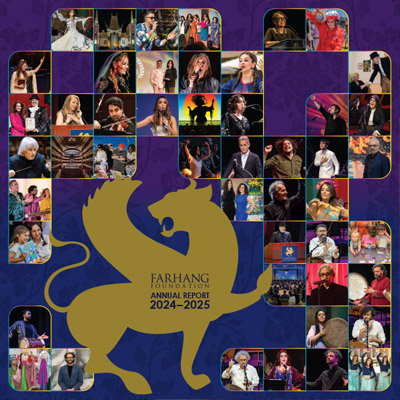Iranian Armenian Ancestral flexibility, adaptability, and continuity
Iranian Armenian Ancestral...
Dr. Claudia Yaghoobi

The Iranian Studies Initiative at UCSB and Farhang Foundation present
Iranian Armenian Ancestral
flexibility, adaptability,
and continuity
a free live lecture event by Dr. Claudia Yaghoobi
In this talk, Dr. Claudia Yaghoobi will examine the ways that diasporic Iranian Armenian authors and artists negotiate their identities as minoritized population in Iran and in the US within a liminal space that includes religious, ethnic, national, racial, cultural, gender, and sexual factors. Yaghoobi argues that this liminal state of fluidity helps them to develop a resilience towards ambiguity and handling ambivalence in dealing with various cultures as well as resisting dualistic thinking which in turn allows them to move beyond national boundaries to transnationalism, yet simultaneously display the collective Armenian identity characterized by flexibility, adaptability, and continuity as a result of both multiple uprooting and a Genocide that continues to this day. They serve as a bridge between the homeland and the host nation, occupying what the author theorizes as verants’ughi – the transformational passageway, which requires them to not only risk being in a transitory space and give up the safe space of home and the power that comes with it, but also through doing so, they create transformative works of literature and art.
About Dr. Claudia Yaghoobi

Dr. Claudia Yaghoobi is a Roshan Institute Associate Professor and the director of the Center for the Middle East and Islamic Studies at the University of North Carolina, Chapel Hill. Yaghoobi is a scholar of Iranian cultural studies, and gender and sexuality studies with a focus on the members of sexual, ethnic, and religious minoritized populations.
She is the author of Transnational Culture in the Iranian Armenian Diaspora (Edinburgh UP 2023), Temporary Marriage in Iran: Gender and Body Politics in Modern Persian Literature and Film (Cambridge UP 2020), and Subjectivity in ‘Attar, Persian Sufism, and European Mysticism (Purdue UP 2017).
She received her Ph.D. in Comparative Literature from the University of California at Santa Barbara in 2013. She teaches courses on Iranian literature and culture, Middle Eastern literature, gender and sexuality, diaspora studies, and human rights. As an Iranian-Armenian-American, Yaghoobi’s research concerns the literature of the Middle East with a special focus on Persian and Armenian literature. Within Persian literature and culture, her focus is on the members of sexual, ethnic, and religious minority populations, ones marginalized by normative society.
Her work addresses the embodiments of liminality through which authors, artists, directors challenge and critique social hegemonies. Her first monograph, Subjectivity in ‘Attar reassesses the significance of the concept of transgression and construction of subjectivity within select works of the medieval Persian Sufi poet Farid al-Din ‘Attar Nishapuri (1145-1221). She traces the intersections of transgression, law, inclusion and exclusion, self and the other, in ʿAttar’s treatment of class, gender, sexuality, and religion.
Her second monograph, Temporary Marriage in Iran examines the representation of sigheh (temporary marriage) in modern Iranian cultural productions. However, the book moves beyond the literary and cinematic realms and examines in-depth a rather controversial social institution which has been the subject of disdain for many Iranian feminists and captured the imagination of many Western observers.
Her third book Transnational Culture examines the various creative ways that Iranian Armenian authors and artists, as members of religious and cultural minoritized populations of Iran and later in the diaspora in the U.S., craft and negotiate a unique notion of self, which is at odds with the wish to be integrated into mainstream society while maintaining ties with the homeland.
Pre-order Dr. Yaghoobi’s new book
Help support Farhang Foundation’s free programming!








